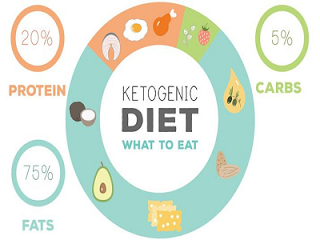Ketogenic Diet Benefits Risks
In the evolving landscape of wellness and nutrition. The
ketogenic diet, often referred to as the "keto diet," has emerged as
a popular choice. Among those seeking a new approach to healthier living. But
what is this diet, and how does it influence your health? What are its
potential benefits and risks?
Discovering the Ketogenic Diet
To understand the ketogenic diet, you need to grasp the
basic principle behind it. Achieving a state of ketosis. Ketosis is a metabolic
state where your body. In the absence of enough carbohydrates for energy.
Starts breaking down fats, producing ketones as a byproduct. These ketones then
serve as an alternative energy source for your body. Especially for the brain.
The ketogenic diet involves a low-carbohydrate, moderate-protein,
and high-fat nutritional plan. This drastic reduction in carbs and increase in
fats shifts the body's metabolism. Towards fats and ketones. The dietary
proportions consist of. 70-75% fats, 20% proteins, and only 5-10%
carbohydrates. Keto
Diet
The Keto Effect: Potential Health
Benefits
Many individuals have turned to the ketogenic diet. In hopes
of realizing several health benefits. Its link to weight loss, due to its
ability to promote fat burning and suppress appetite. This could be a boon for
individuals struggling with obesity. Or those who are on a weight management
journey.
Some studies suggest the ketogenic diet may improve certain
metabolic markers. Such as cholesterol and triglyceride levels, reducing the
risk of heart disease. For those with type 2 diabetes or insulin resistance.
The keto diet could aid in managing blood sugar levels. By reducing the body's
dependency on glucose.
For some, the diet is an adjunctive treatment. for specific
neurological disorders like epilepsy. Preliminary research indicates potential
in other areas like
Alzheimer's, Parkinson's. And certain types of cancer. But
more conclusive studies are underway.
A Word of Caution: Potential Health
Risks
But it's not all sunshine and roses on the ketogenic diet.
As with any major dietary change, we must be aware of potential risks.
Adherence to the ketogenic diet can lead to a complication
like "keto flu." Symptoms such as fatigue, nausea, and irritability
may occur. Due to the sudden change in the body's fuel source.
Long-term adherence to the keto diet may also lead to
nutrient deficiencies. Due to the restricted intake of certain fruits,
vegetables, and grains. Concerns are being raised about the effect of a
high-fat diet on heart health. And whether it may increase cholesterol levels.
For individuals with pre-existing liver conditions or
pancreatitis. The increased load on the liver due to fat metabolism. Might
exacerbate their conditions. People with type 1 diabetes should be cautious.
Since the diet could lead to a dangerous state known as ketoacidosis.




Comments
Post a Comment